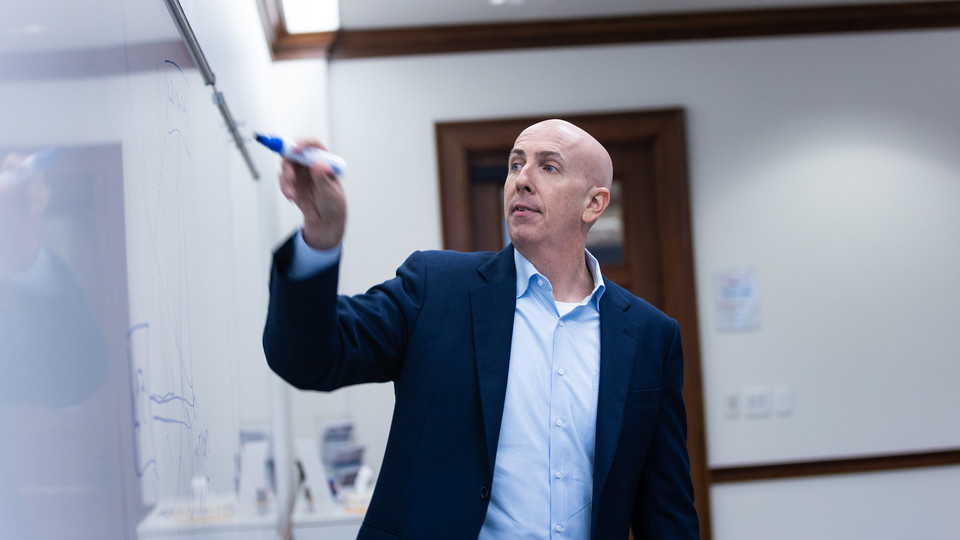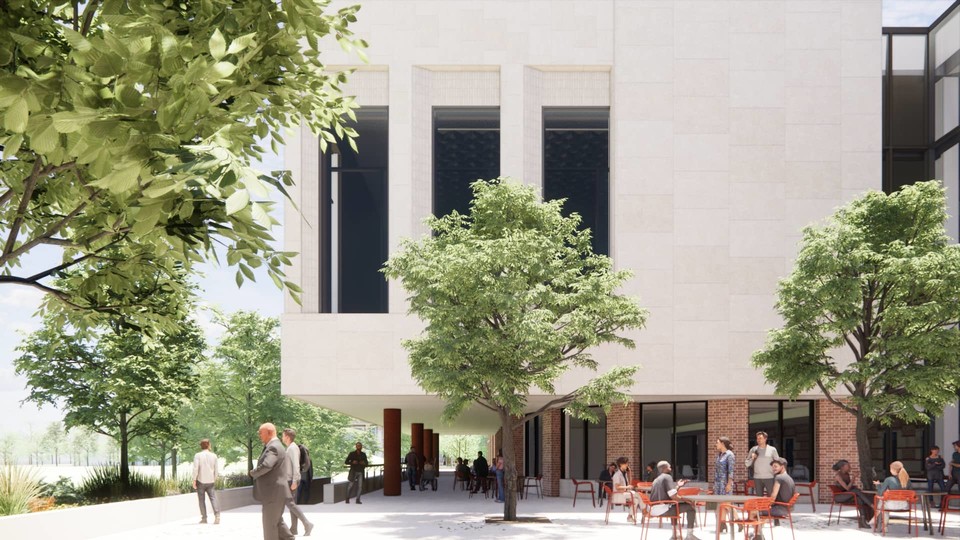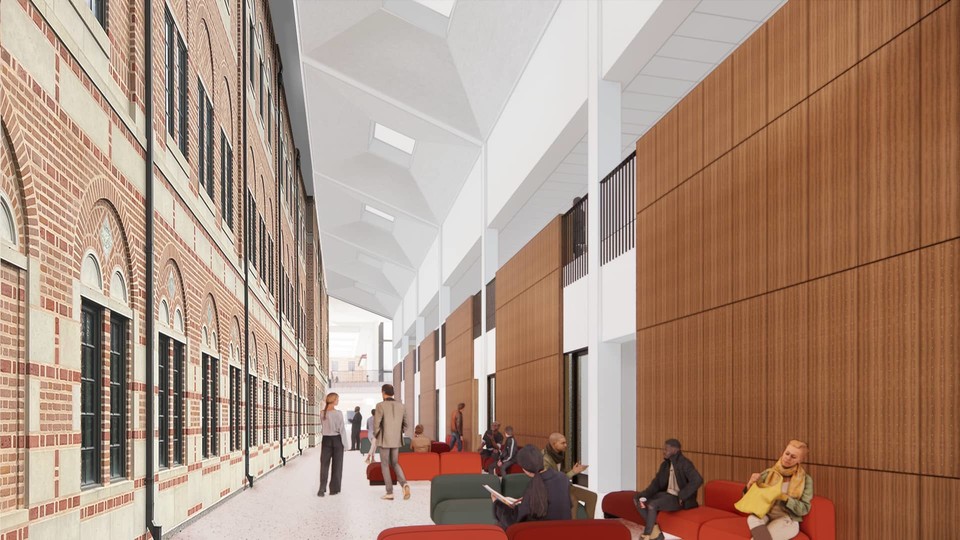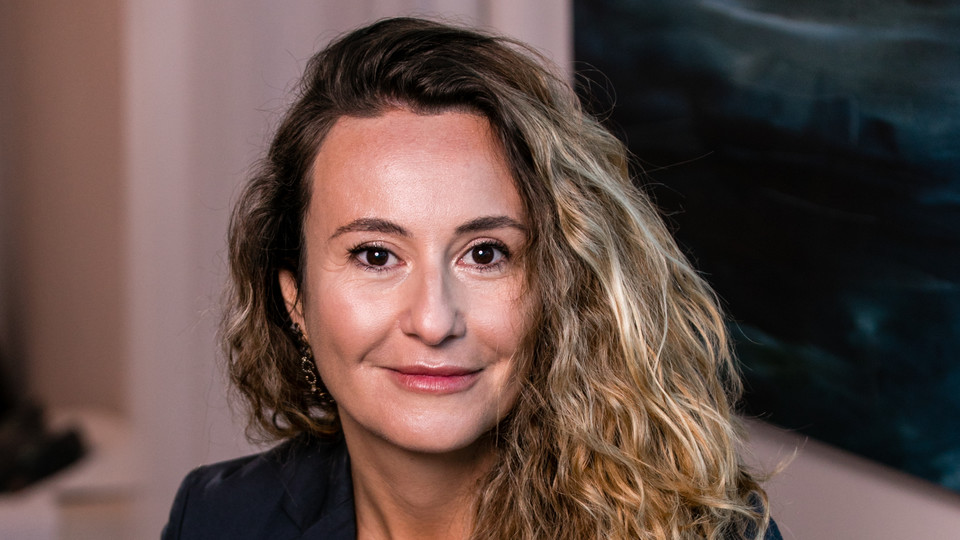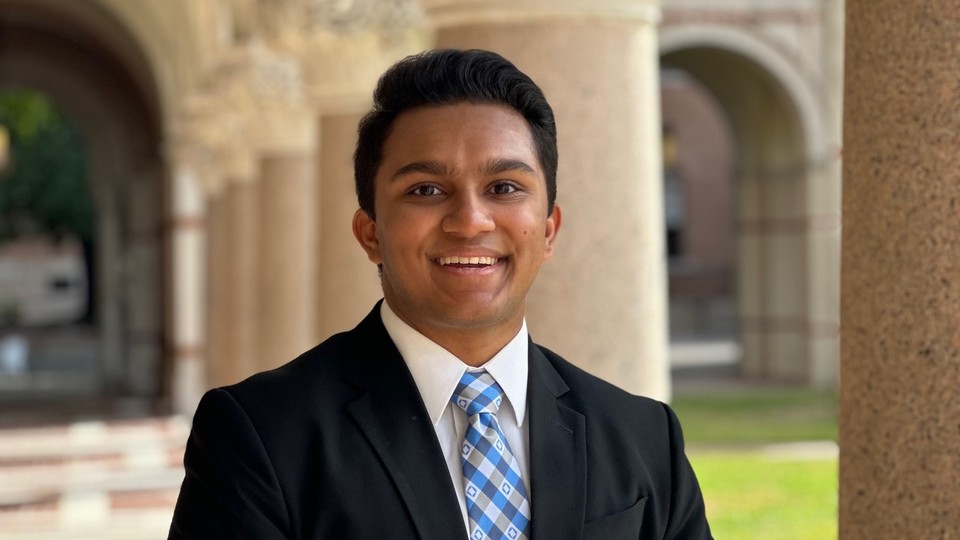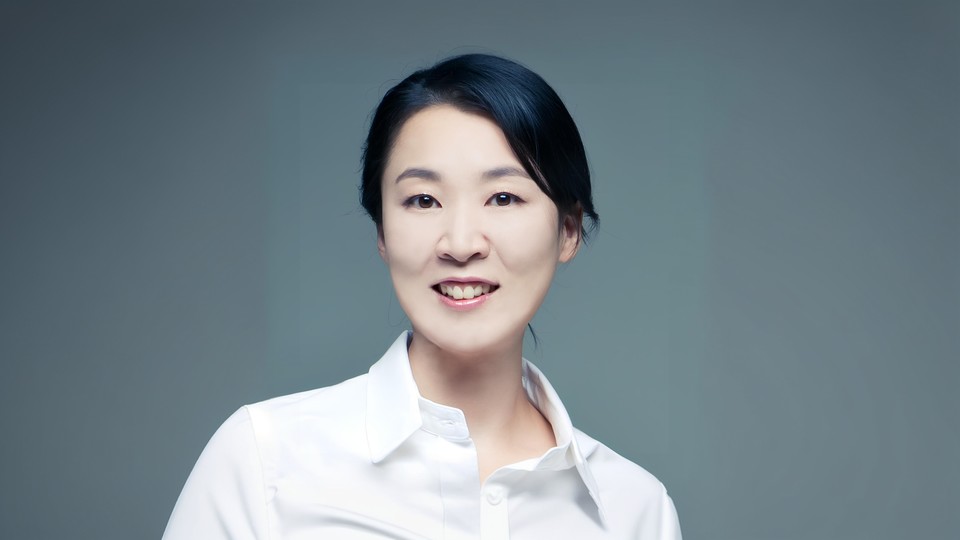Rice Business celebrates future trailblazers and world-changers at commencement
A new cohort of Rice University Master of Business Administration graduates crossed the stage May 3 and are heading out into the world to bring their knowledge and experience to organizations across the nation and beyond. This commencement weekend also featured the first class of students at Rice to attain their bachelor’s degrees in business May 4.
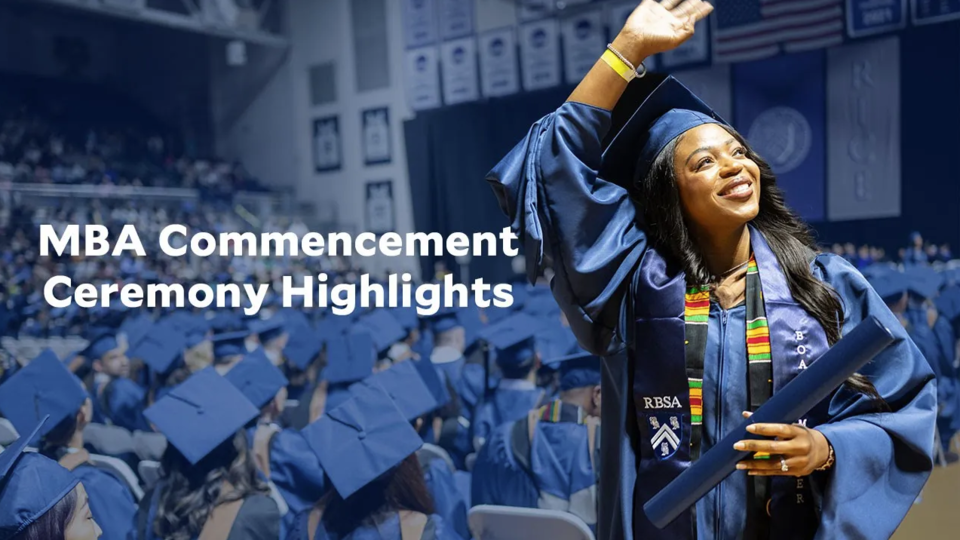
A new cohort of Rice University Master of Business Administration graduates crossed the stage May 3 and are heading out into the world to bring their knowledge and experience to organizations across the nation and beyond. This commencement weekend also featured the first class of students at Rice to attain their bachelor’s degrees in business May 4.
More than 400 graduates were invested with their master’s hoods and received their advanced degrees at the ceremony in Rice’s Tudor Fieldhouse May 3 and enjoyed a thoughtful speech from Rice President Reginald DesRoches.
“Completing an MBA takes discipline, initiative and focus,” DesRoches said. “The skills you have gained in pursuit of your degree go well beyond your finance, economics and marketing knowledge.”
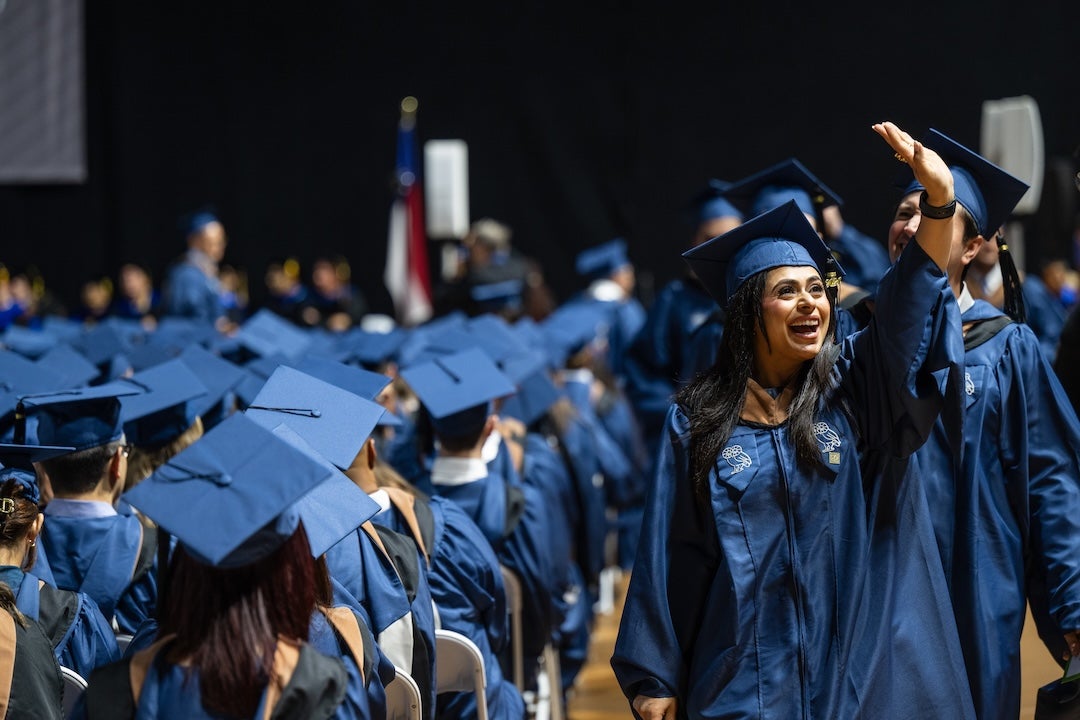
The annual M.A. Wright Awards are nominated by the class and given to well-rounded, exemplary graduates across all of the MBA programs to honor their outstanding academic performance, selfless leadership, community stewardship and career progress.
2024 M.A. Wright Awards
- Full-time MBA: Ahmad Tipu
- Executive MBA: Daniel Williamson
- Professionals evening MBA: Nikki Suarez
- Professionals weekend MBA: Ben Provenza
- MBA@Rice: Sarah Aboukhair
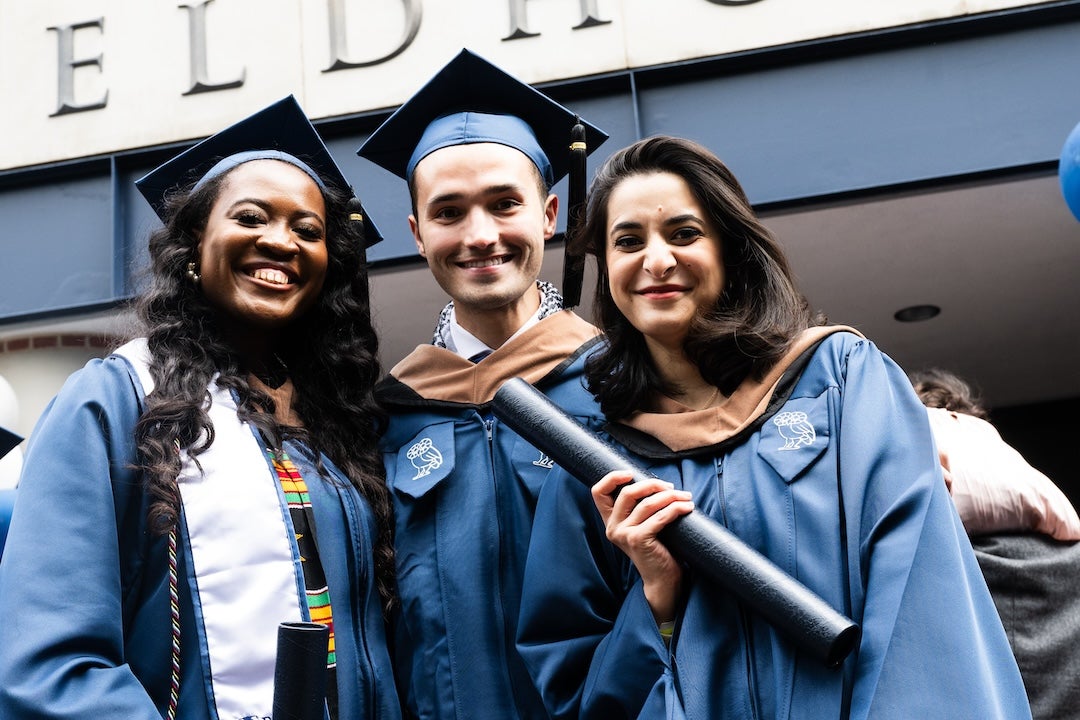
The Faculty Teaching Excellence Awards are conferred upon faculty members selected by the graduating class to honor these professors in each program for their commitment to Rice Business’ mission of creating community and excellence.
2024 Faculty Teaching Excellence Awards
- Full-time MBA: Balaji Koka
- MBA for executives: Petrus Ferreira
- Professionals evening MBA: Kunal Sachdeva
- Professionals weekend MBA: Prashant Kale
- MBA@Rice: John Buffington
Another annual tradition is an award chosen by alumni who graduated two and five years ago and honors a faculty member for excellence in teaching. This year’s Jesse H. Jones Graduate School of Business Award for Teaching Excellence went to Utpal Dholakia, the George R. Brown Professor of Marketing.
Julian Duncan ’99, chief marketing and strategy officer for the Houston Rockets and a Rice alumnus, was the 2024 commencement speaker for Rice Business. Duncan, who returned to Rice to earn his MBA in 2006, encouraged the graduates to chase a career that feeds their passion and excitement.
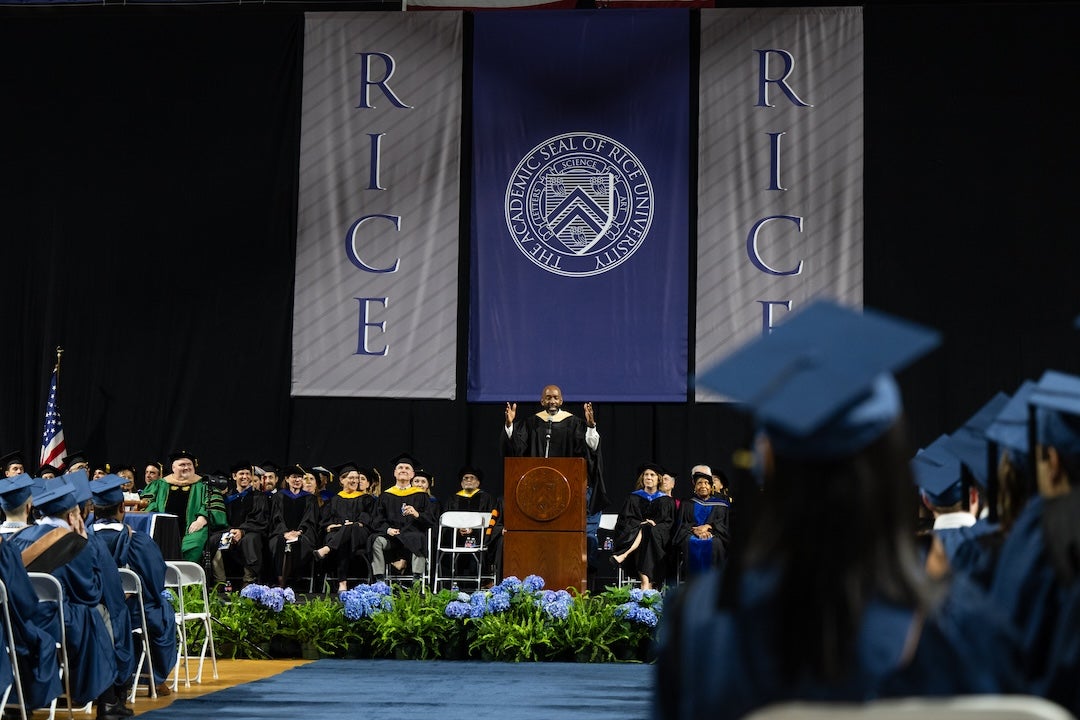
“A compelling story is one of the most powerful weapons in your leadership arsenal,” Duncan said. “It can connect you to others, help you articulate your vision, get your marketing buddies to understand data a lot better or even get investors to support your entrepreneurial dream.”
Saturday night’s undergraduate commencement included 60 students receiving their bachelor’s degree in business. The major came to fruition in 2021 when Rice Business Dean Peter Rodriguez recognized the demand for deeper business education from current and prospective students and knew Rice Business could deliver to undergraduates the high-quality degree programs it has always delivered to its MBA, Master of Accounting and Ph.D. students.
Rice undergrads are known for setting a high bar — rigorous academics, multiple majors and minors, research with faculty and gaining real-world experience with internships, part-time jobs and entrepreneurship competitions. To complete a major in business, students must also complete a finance or management concentration, which requires additional advanced courses. Both concentrations provide the knowledge, research and analytical skills to solve a broad array of today’s business problems.
By taking the inherent strengths of Rice students and combining them with the rigorous business program and the entrepreneurship ecosystem of Houston, Rodriguez explains that Rice Business is creating a new kind of leader who can address critical issues in the world. This includes areas such as accelerating opportunities in the energy transition, artificial intelligence and other fields or contributing to the vitality of urban communities.
“Our undergraduate business students will be uniquely capable of doing that,” Rodriguez said in an interview with Poets and Quants.
The graduates had a preliminary celebration the morning of May 3 at McNair Hall, home of Rice Business, where Rodriguez congratulated the first class of “trailblazers” on their accomplishment and presented awards.
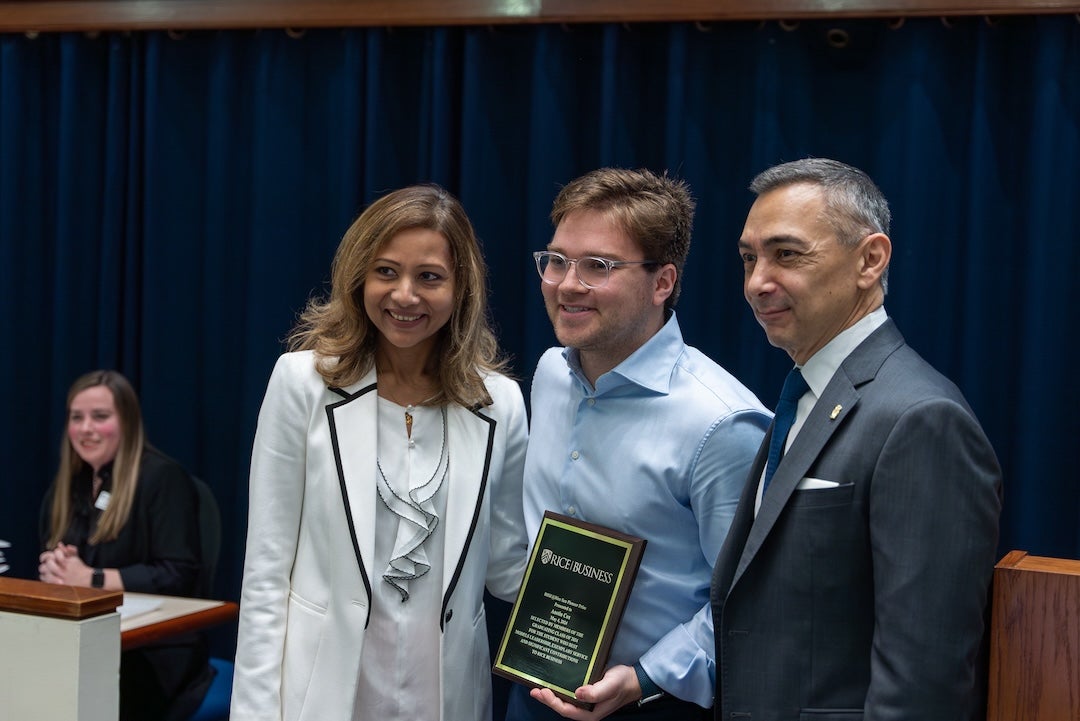
“Talk to these students, look at what they do: There are no finer students anywhere,” Rodriguez said. “Exquisitely well-trained, smart, hardworking, ambitious — these are people who can really go out into the world and make a difference to solve some of the problems of the world.
“It’s a tumultuous time, in some ways, on college campuses. But that’s in part because college campuses are the place where we’re intended to think about, debate, suss out good answers to problems like these. Who better to do that than these Rice undergraduate students? They’re truly extraordinary.”
The Faculty Teaching Excellence Award has been a staple of the MBA program, and Rice Business chose to continue that tradition with the undergrad degree. The winner is determined by the graduating students, and this year they selected Management Accounting Professor Ben Lansford as the inaugural winner.
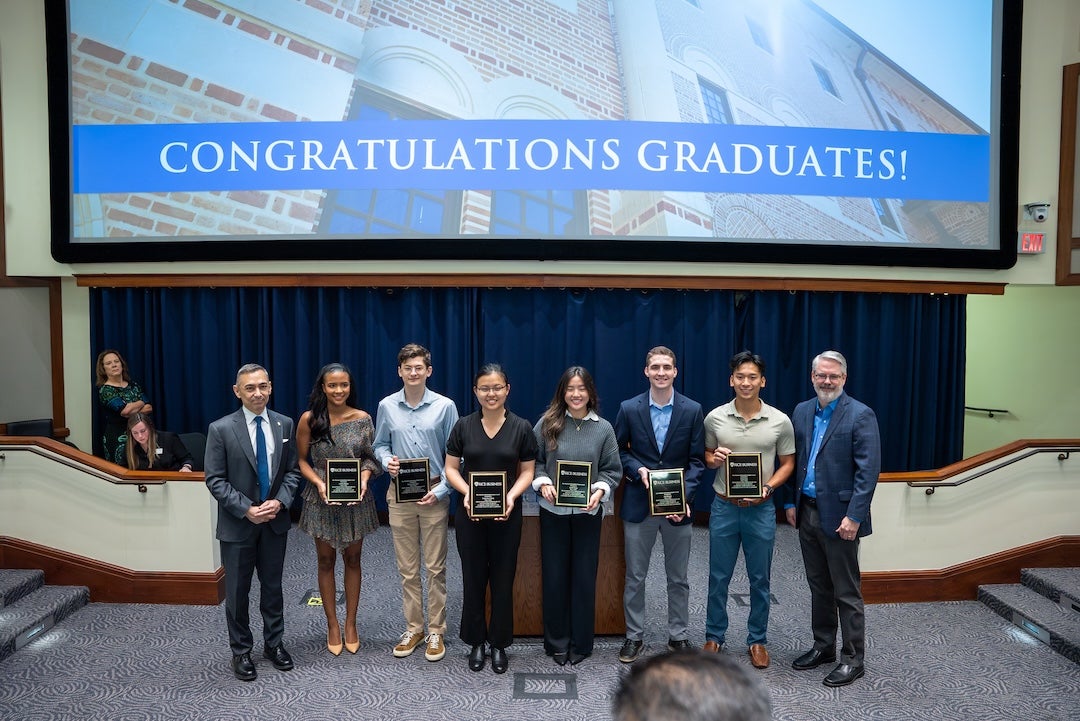
The Rise@Rice Sen Social Pioneer Prize and the six Rice Business Outstanding Student Awards were created especially for the undergrad program. The Pioneer Prize winner is nominated by their peers and selected by a committee to honor a student who embodies the highest standards of leadership, compassion and collaboration within the business school community.
“I’ve learned so much through this major, and I’m so grateful for everything that’s been given to me by my teachers and my peers as well,” said the winner, Austin Cox.
The Outstanding Student Awards are determined by faculty based on academic performance as well as contributions to the school and major. The inaugural awards were presented to Jordan Billups, Sean Cartwright, Katherine Cheng, April Chung, Joel Hrncir and Ethan Kao.
The major joins Rice Business’ other offerings for undergraduates, a minor in business and a minor in entrepreneurship. Rice Business’ graduate programs offer an MBA, a one-year Master of Accounting program and a Ph.D. program in business, the latter for students seeking academic careers at research universities.
If you are a current Rice student with questions about course or program details or about declaring the business major or minor, please email business.major@rice.edu.
Visit the 2024 commencement photo gallery here, and use #RiceGrad2024 to tag your photos and posts.
You May Also Like
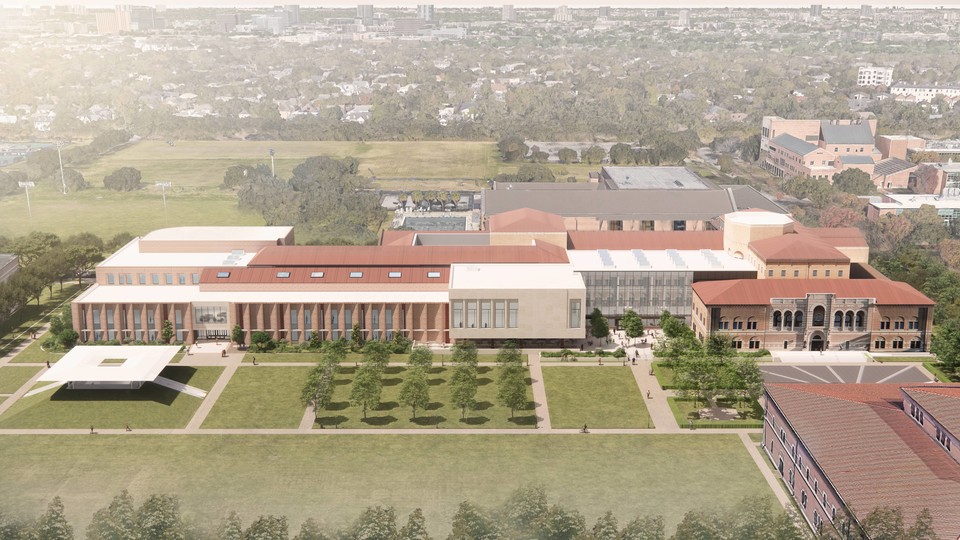
Houston’s Rice University already has one of the country’s top business schools, and a new facility could further enhance its lofty reputation. On Thursday, May 9, the school announced it had broken ground on a new, 112,000-square-foot building for the Jones Graduate School of Business.
Groundbreaking ceremony for new Rice Business building on May 9
Rice University’s Jones Graduate School of Business will host a groundbreaking ceremony for a new 112,000-square-foot building designed to accommodate unprecedented growth at the school and the evolving needs of the community.
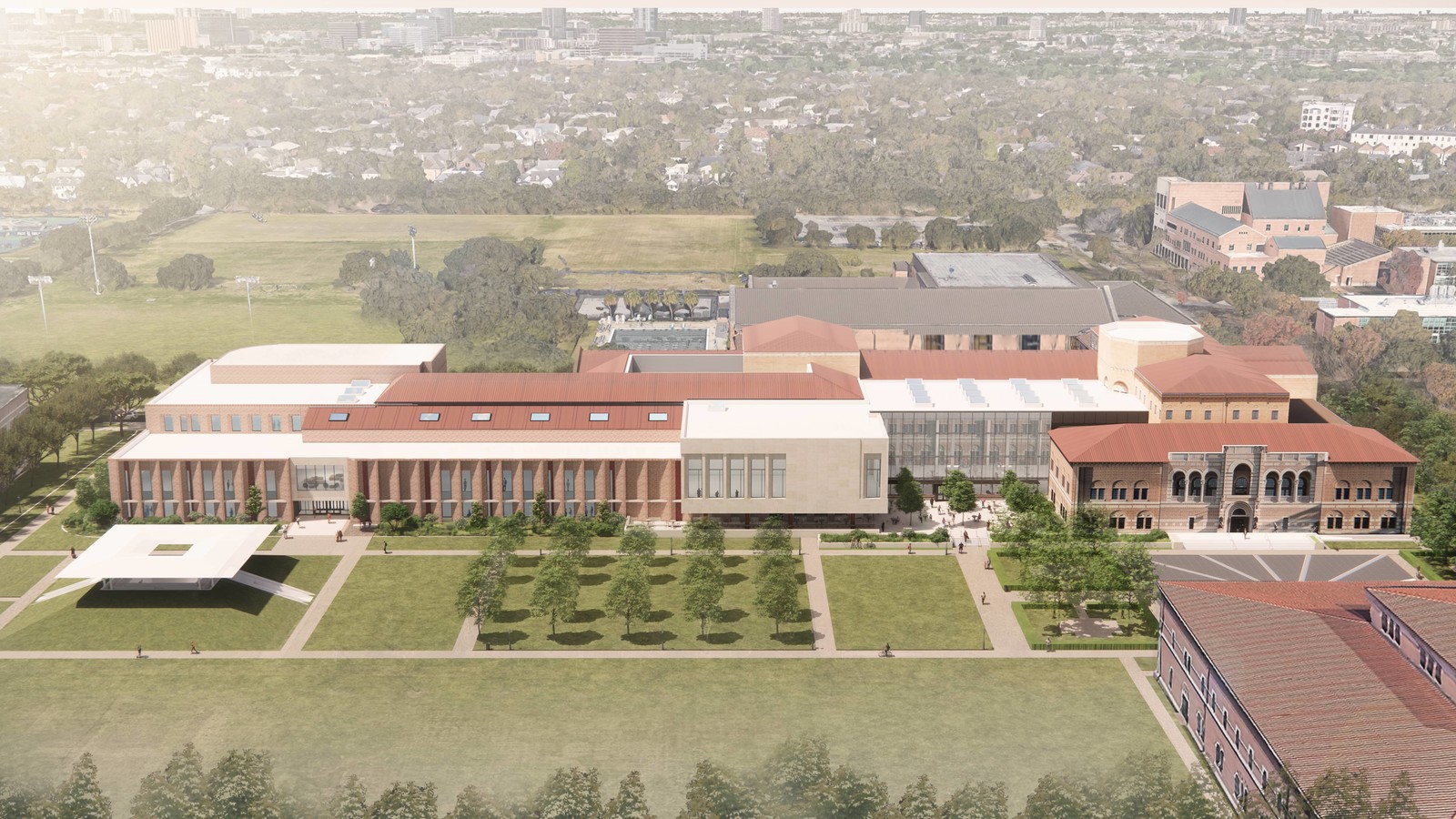

Rice University’s Jones Graduate School of Business will host a groundbreaking ceremony for a new 112,000-square-foot building designed to accommodate unprecedented growth at the school and the evolving needs of the community.
The new structure will feature state-of-the-art classrooms, modern office spaces and vibrant amenities such as dining areas, open gathering spaces and facilities for private events. The building will seamlessly integrate with McNair Hall — the current home of Rice Business — enhancing the campus environment and continuing to cultivate a collaborative culture.
Over the past five years, Rice Business has experienced rapid growth of its new undergraduate business major, a 50% increase in MBA students, a 41% increase of faculty and an increased cohort to the full-time MBA program and the MBA@Rice and hybrid MBA programs.
What: Groundbreaking ceremony for new Rice Business building
When: Thursday, May 9, 3-5 p.m. The groundbreaking will take place around 3:50 p.m.
Where: Woodson Courtyard at Rice’s McNair Hall. Complimentary self-parking available in the Central Garage.
News media who are interested in attending must RSVP with Avery Franklin, media relations specialist at Rice, at AveryRF@rice.edu or 713-348-6327. Architectural renderings will be provided to the news media.
You May Also Like

Houston’s Rice University already has one of the country’s top business schools, and a new facility could further enhance its lofty reputation. On Thursday, May 9, the school announced it had broken ground on a new, 112,000-square-foot building for the Jones Graduate School of Business.
General Counsel Alex Cestero Is Leading His Team to New Heights
Alex Cestero '08 is building a high-performing legal team at Virtuoso. But he’s also taking steps to ensure his new team stays both healthy and engaged.
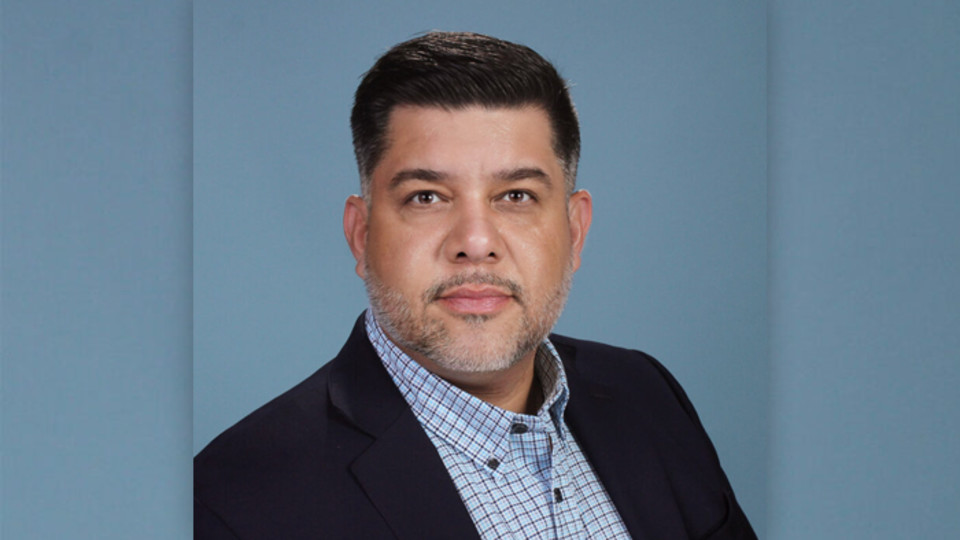
Why does my electric company need to advertise?
Whether or not you pick your utility, it might sell ancillary products and services, like smart meters and protective coverage for your gas line, says Rice Business professor Utpal Dholakia.

Innovation Across Generations feat. Adrian Trömel ’18 & Klaus Trömel ’85
Season 4, Episode 15
The father and son duo delve into their careers, their decades-spanning relationship with Rice Business, personal anecdotes, and how an entrepreneurial mindset propelled them both forward.
Owl Have You Know
Season 4, Episode 15
For Adrian and Klaus Trömel, getting an MBA from Rice Business was a family affair.
Klaus Trömel served as the secretary general of the European Investment Bank (EIB) until his retirement in March 2018. He began his career as an analyst at Hewlett-Packard’s European headquarters in Geneva before working as a trade and pre-export finance officer.
Adrian was named the assistant vice president for strategy and investments for Rice University’s Office of Innovation in August 2023. In this role, Adrian supports the design and integration of commercialization structures, resources and initiatives across the university to support early-stage inventors and entrepreneurs.
The father and son duo join host Scott Gale ’19 to delve into their careers, their decades-spanning relationship with Rice Business, personal anecdotes, and how an entrepreneurial mindset propelled them both forward.
Subscribe to Owl Have You Know on Apple Podcasts, Spotify, Google Podcasts or wherever you find your favorite podcasts.
Episode Transcript
-
[00:00] Scott: Welcome to Owl Have You Know, a podcast from Rice Business. This episode is part of our Flight Path series, where guests share their career journeys and stories of the Rice connections that got them where they are. Thank you for joining us. I'm Scott Gale, a co-host here on the Owl Have You Know podcast.
And in this episode, I have father and son alums, Klaus Tromel and Adrian Tromel on the show. Klaus recently retired as the secretary general of the European Investment Bank. And Adrian recently took on the post of assistant vice president for strategy and investments for Rice University's Office of Innovation.
They talk us through their problem-solving careers, their decades-spanning relationship with Rice Business, and how an entrepreneurial mindset propelled them forward. Let's get into the discussion. Gentlemen, welcome to the show.
[00:47] Klaus: Thank you for having us.
[00:49] Adrian: Thanks, Scott.
[00:50] Scott: Been looking forward to this. This is a father-son combo, a lot to, kind of, cannonball into. I think I wanted to just, kind of, start with you, Klaus. Paint a picture for us, Rice Business. What were, sort of, the circumstances leading up to joining the program, I'm assuming, in 1983 and ultimately graduating in 1985? What were you working on? What were you doing? And why Rice?
[01:13] Klaus: Well, Scott, I hope you have enough time. We're talking now 40 years ago, probably even a little bit more, when the idea matured. Having studied civil engineering with business in parallel in Berlin, and then the civil engineering side, water wastewater, I was always interested in project finance, limited recourse project finance.
So, I was always interested in the duality of engineering and business, particularly finance, and that particularly on the development side as well. Having finished in Berlin, I, sort of, looked around. And coming from Berlin, I have to admit, the U.S., for business, was clearly by far the number one. And with a friend of mine, we picked up the number of hours of sunshine.
Therefore, California, North Carolina, and Texas were the states in which both he and I applied. Myself, I got accepted to a couple, three universities in total. He, my friend, ultimately went to Duke. I'd also been accepted at Fuqua, amongst others. And what made it to Rice was that the Jones School, as it is still called, but was the only name at the time, was a very small school, only 60 students per class per year, so 120 in total, and the openness.
Without asking, and I think, at the time, it was unique, at least those schools that I had gotten further in discussions, they sent us the CVs of all of the professors. And, let me already jump forward a little bit, the most fantastic thing about the Jones School, Rice Business, was that Adrian still met three of my professors.
He had one of them, worked for one of them, and one other one became a very good friend, the other one being the iconic Stephen Zeff, the accounting professor, who is a fantastic person. And that, I think, speaks for Rice. The selection of the students at the time was very, very impressive. As I said, with a class of only 60, they were extremely caring about the students and supportive about the students.
And then there are certain things in the training that we can come back to later. So, yes, it was a combination of wanting to do project finance, limited recourse finance, where the engineering and the business had to come together, with the fact that, although I think Germany and Europe in general has gotten better…and I have to say, the atmosphere there, both at Rice, generally at Big Rice, and at the school, were just fantastic.
You could walk into anything. You could go anywhere. You could do everything. The only thing that I remember, when I see where Adrian was allowed to study, we started up in the basement of the Computational Science building. That's all we had at our disposal when I studied there. And so, when I look at the Herring Hall now, and I think they soon will have an extension and/or a new building with the way they grow, I have to say I'm green with envy.
[04:29] Scott: There's a lot to explore here. I think you've retired in recent years as the secretary general of the European Investment Bank, that's been a few years, but wanted to hear from you about... This is a big, broad stretch, multiple decades of, sort of, banking and, and activity going on, sort of, in Germany. I feel like we could have an entire, you know, episode just on that.
And we've got Adrian waiting in the wings. So, I want to, kind of, fast forward us up to this point where you're working with the European Investment Bank, and some of the activities that are going on, and what got you excited about that final chapter of your career, and ultimately, kind of, what led you there.
[05:05] Klaus: Oh, wow. If I may, not totally following your script, because I think it is typical for Rice. Look at Adrian's grin. My first job was actually at Hewlett-Packard. And that came about very interestingly because somebody came and saw me and said, "You have to go. There is a recruiter from Hewlett-Packard there. And he looks like Einstein reincarnated."
So, it was actually true, was actually a German, head of test and measurement at Hewlett-Packard, spoke still with a German accent that you could slice through, and he said, "What are you doing here? I'm looking for engineers." And he took my CV anyhow. Long story short, I just walked out of an interview that didn't go well because they wanted to offer me places in geographical areas I didn't want to go to. And I said, "No, I'm not going there." And it didn't come together.
And I walked out. And I did get a call from Hewlett-Packard, and said, "Wow, I'm going to get flown out to California," because I'd never been, at that point in time, in California. And they said, "No. We're flying you to Geneva." And then various things happened in Geneva. And I had just quit my job for various reasons. Again, different story. When Adrian's brother tells me somebody from Luxembourg called. So, I called that number, and it was the European Investment Bank.
Like many international agencies, they also have to keep an eye on nationality quotas. And so, at that point in time, they needed Germans. I had applied many years earlier. They had said that, "We'll keep your CV on file." I said, "Yeah, I'll never hear from you again," but, actually, I did hear from them. And so, there, I joined. My experience in Rice and in Texas helped me enormously because in the beginning, I did oil and gas in the North Sea.
So, I find there's a whole bunch of oil fields, gas fields, pipelines, with mid-sized oil companies, innovative oil companies, smaller ones, few bigger ones. And later on, I switched into transport. So, I really got to do what I like to do in a big scale, mainly in the UK. At some point in time, I was moved into risk, to go into the other side of the fence, keep an eye into what my former colleagues were doing on the lending side.
From there, I slowly slipped into, sort of, the asset, the balance sheet management. From there, going into the crises, I slipped into workouts and distressed. We started to have a few cases that went bad. And I guess one of my claims to fame is the Eurotunnel restructuring. It's a decent sized restructuring, decent complexity.
And to thank me for that, and I really loved my team at the distressed, that I was allowed to put together a really fantastic group of men and women, women and men. And I loved the content. Although, of course, at times, it was a bit stressful. They then asked me to become the CRO of the outfit, straight into the Greek country crisis, which made my life interesting. And then having messed up risk so much, they asked me to become the CIO.
So, my last three posts were not applied for. They would say, "You go there now." Then I was CIO for a while. It's a big outfit. Balance sheet is about two and a half times of the World Bank. Staff is about a quarter of the World Bank to a third of the World Bank. So, you can imagine. It's a different, it's a different working environment, but it gives you a size.
You know, we're talking over half-a-trillion balance sheet, plus half-a-trillion-plus balance sheet, close to 100 billion of U.S. dollars lending per year. And then having done the CIO for a while, they asked me to become the Secretary General. And I was of the point of view that, particularly those outfits at those levels, you go where they tell you to go and you quit.
So, I have to say the workout was the funnest part. Financing was fun as well. Workout was really, really fun because I also had a fantastic team. Risk was stressful because it also meant, and that's where the Rice training was very valuable, the human side. The human resources management was very valuable. Rebuilding a team that had been abandoned, who were stressed because of the environment, was very, very taxing.
And of course, these were 12-to-16-hour days in that environment at the time. The CIO role where, because of the public nature of the European Investment Bank, which is owned by the 27, now 26, with Brexit member states, we faced many of the same problems with the commercial banks in terms of our borrowers hurting in the crisis, but unlike the commercial banks, the government asked us to do more.
So, we did not face the challenge of having to let people go like commercial banks, but very much to the contrary, we had to do more than before to compensate the shortfall, the banks falling back. And being an outfit that it is, once you have established a certain reputation, it is a natural call for an understanding of what is also a political environment, that they needed somebody to...
When the previous Secretary General, who had been living through the crisis, said, "Enough is enough, I'm just physically tired," and they quickly needed somebody to jump in who knew the outfit inside out, knew everybody inside the EIB, and could get things done rapidly, that the then chairman, who is a political appointee, said, "Klaus, you don't really have a choice. You're coming over here."
And then I cut a deal. And I said, "Listen, this is really not my cup of tea, and sitting in meetings, chairing meetings, co-chairing meetings, supporting the chairman day in and day out, three-day long meetings with 80 to 100 people in the room, et cetera." I said, "I'll do that until 2018, '19, and then we'll part." And as it was the third time that they asked me to move without me having applied, they said, "We don't like it, but that's the deal."
So, being secretary general also during the Brexit, when you lose from one day to the other 16% of your capital. And the Brits had understood. And I always remember negotiating with the Brits, who I knew well, having worked in the UK, had actually realized that all of their discussions with the commission were of one type, but the one place where they actually had a leverage over the European Union was the EIB.
So, while they were very keen not to hurt us, because a very good relation had done a huge amount in the UK, they had no qualms, because that's a must, to using us as leverage because removing from a bank 60% of the balance sheet in one go in a highly leveraged institution as it was, you can imagine what that was. So, being the secretary general during those negotiations at the European level was another additional taxing outfit. So, then I decided, I have done it, I have seen it, it's no more fun, and the people who want to do it, let them do it.
[12:04] Scott: Yeah, no, Klaus, that's really interesting. And there's not, like, an elegant pivot here, but I'm curious, like, during this time, Adrian, you're clearly considering coming to Rice, given this timeline. Just, like, take me to, like, the conversation around the dinner table, around all of this swirl of activity that's going on, and you're, kind of, thinking about your career and where things are going.
Your dad's... you know, like he's saying, he's working 12 to 16 hours a day, working on all these, you know, major challenges that are in headlines across the U.S. Like, take us to one of those dinner table conversations and what you're thinking through.
[12:37] Adrian: Definitely. There are a couple, I think, anecdotes. And, dad, jump in or correct me if I tell a story wrong, but there are a few of his stories that, I think, stood out to me, and drove me to, on first part, studying material sciences, and then led me to also wanting to pursue business.
One that stood out to me is an anecdote that my father occasionally likes to tell, where he, as a kid, saw some financiers looking at the plans of a... I want to say a dam, or some other construction project, and they were looking at them upside down. And they were supposed to finance it, but they did not have any idea how to read it. That one just showed, rare is the discipline in the world that is only a single subject.
And then the other one is my father has a number of those anecdotes, but especially when he was... I think the title is loan officer in the EIB, he would go out and also meet the people who would be individually affected by the projects that would get financed.
And you have to imagine the EIB, the European Investment Bank, is mandated to finance projects that in some way, shape, or form, affect the people or the economies of the EU. And in that sense, that means they finance roads, research, schools, infrastructure, be that wastewater, power generation, et cetera. He tells a story of being on a ferry and meeting somebody from-
[14:09] Klaus: Scotland, Isle of Skye.
[14:11] Adrian: ... Scottish Isle of Skye, and of meeting somebody on that ferry. And they were going to build a bridge to connect the Isle of Skye to the mainland. And there were a lot of people who were saying, "No, we don't, we don't want this bridge. It's going to ruin a bunch of things."
But then this gentleman took my father aside, who was obviously from the group of the European Investment Bank, and said, "We need this bridge. Without this bridge, if my wife, who is pregnant, gets sick, and there's a storm, a helicopter can't fly to come get her. And there's no hospital on the island. If my child is sick, I can't get them over. If we need food, and we run out at the local grocery store, and there's a storm, I have no way of getting across."
The people who live on this island need this. And so, that one went to go on to show…it was like, well, so, there's a way to bring together a variety of disciplines, and a way to really help people with that. So, those are two little stories that he would occasionally tell at the dinner table. Then how did that get me to Rice? So, I always sucked at making decisions. So, that's the reason I studied material sciences.
A civil engineer can pour concrete conceptually without a mechanical engineer who can turn gears without an electrical engineer who can print circuits without the other, et cetera. Conceptually, in terms of the knowledge of the discipline, none of them would have a medium on which to work or with which to work without the material scientist. So, in the end, I realized material sciences was a facilitator. It was a language school of engineering. Nothing else.
And with that, that's what drove me to do material sciences. And I ended up studying that in Switzerland, studying in French. And there, I started seeing... I was like, "Well, how can I work on the things that will affect people's lives, really have an impact?" because I'm a good millennial and impact is the thing that I want.
And the things that stood out were I was fortunate enough to work with a startup, get some exposure to the startup ecosystem in Switzerland, and then eventually in the Netherlands. And I realized, like, hey, at a startup is where you really work on the most cutting edge things. It's where people are willing to take a risk to try something new. And so, that's what took me to the Netherlands. Worked at a startup there.
And I looked around and said, "Wait a minute. There's a language still missing." And that language is business. And looking around, of course, at the dinner table, we'd get the Rice Business alumni and Rice alumni magazines. And having studied material sciences, specifically actually nanomaterials, I was familiar about Rice from home, and I was familiar about Rice from school.
So, it just made sense to really consider that school. And now, I was actually working at a medical device company. And it turns out some of our medical advisors were also in the Texas Medical Center. And so, things just kept on pointing to Rice.
And with that, of course, I applied to a number of different schools, got into a number of international business schools, but the combination of the history and material sciences, the world's largest medical center, and this massive reputation in entrepreneurship that had been started by Ed Williams during my father's time, just made it the right choice.
[17:29] Scott: Can we talk about the role of entrepreneurship? And that connection with Ed Williams is, sort of, like... Because in a lot of ways, Klaus, your career didn't, sort of, touch entrepreneurship, right? You're talking about, kind of, traditional finance. And so, I'm curious, sort of, how the entrepreneurial bug where that was seeded and, kind of, how that thread, kind of, came along throughout the years.
[17:50] Klaus: I would say, and Adrian, you jump in as well. First of all, the stories were all perfect. The way I would put it, and I cut a long story short, EIB founded in... I think it was 1994, what is today one of the top three funds of funds for startups called the European Investment Fund. My former deputy now runs it. I guess if I had screamed loud enough, I could have become the CEO of that outfit, but been there, done that.
You're absolutely right. I was never directly involved in the startup and financing an individual startup. I did very much have my fingers in setting up the EIF, European Investment Fund, and then in particular, much later in the 2000s, focusing it... because it had a duality, a dual approach, at the time, but in 2000, focusing it on startups and newly created companies. So, I had it relatively heavy.
And then at some point in time, I was managing the shareholding for EIB. And then EIB, because limited recourse finance, because EIB did a lot of public sector, financing governments, local governments, I was focused on limited recourse finance. So, to have highly specialized, highly risky finance has a few parallels.
The underlying technology is different, but how many cars will cross a bridge or how many gimmicks are you going to sell are questions that are not unfamiliar in terms of forecasting. Okay. Technology was most of the time there. And then the other element that…Adrian did get a whiff of EIF for sure, left, right and center. The other element is that…EIB itself.
Also, when I was heading risk, enabling it, various instruments, financial instruments, so my focus was on the financial instruments, not the doing, but setting up the instrument, we went into much riskier financing. So, we set up programs whereby in pharmaceutical companies, we shared the risk of a successful development of a new molecule.
EIB had actually financed the cancer site of the development at BioNTech, which enabled the development of the COVID vaccine together with Pfizer. So, that is where Adrian got some exposure to the atmosphere, to the environment of startups, without being in the startup environment itself.
[20:31] Adrian: You can think about the range of impact or the depth of impact you can have. You start off with one-to-one impact, which can be very deep, like, a single doctor might have, then you go to, for example, the inventor of a technology, or the CEO of a business, or inventor of a technology, which is already broad, how many people buy that product, the CEO of a business, assuming multiple products, gets even broader.
And then when you go into the financing of things, especially if you do that finance from the right perspective and with the right structures behind it, you can, one, ensure the success of those companies and those products, and then finally down to those individuals.
And so, to your question of, well, how is that red line connected to entrepreneurship is, without having an understanding of entrepreneurship, I don't think you can necessarily be at the top of your game in that role either. And so, finding a place where you can understand. In my case, at the time, I thought I wanted to do commercialization, and whether that was big or small.
I realized that that field of study is entrepreneurship. Finding a place to study that entrepreneurship to be able to decide whether you want to run an individual initiative, run multiple initiatives, or be able to evaluate those, to be able to finance them, is where I think finding a place to properly study entrepreneurship makes sense because you can apply those principles anywhere in life.
[22:02] Scott: I think that's so important. And I appreciate you, guys, exploring this with me because this idea that entrepreneurship can be taught, this idea that there are principles at play, and I think it's a tendency for, and maybe this is a U.S. thing, or it's got a global, sort of, angle to it, is romanticizing entrepreneurship, like it's some end state that you get to just, sort of, be, you know, the well-known entrepreneur, but there's so much that can be done in established organizations.
I reflect on, sort of, my own lens on entrepreneurship and what that's meant in my discovery along the way. And so, that's, sort of, the source of the inquiry is just this ability to bring entrepreneurial principles to light, regardless of where you're sitting.
And maybe you might want to call that intrapreneurship versus entrepreneurship or however that might be, but it's this idea of balancing and understanding risk, generally, and characterizing that across different categories, technology risk, commercialization risk, human behavior risk, all these different uncertainties that, kind of, play into that. There's actual, like, real principles that are driving that. And so, I think you guys, represent that so incredibly well.
[23:08] Adrian: Yeah, actually, I want to expand on something you said there is that entrepreneurship is being taught the discipline of evaluating those risks. And it's the discipline of being taught to make holistic considerations.
Because, Scott, in your role at Halliburton Labs, supporting whether it's your internal projects or the external startups that you bring in across climate and energy, or whether it was my father in his career, financing, be it R&D or a new business model on how to run tolls on bridges or highways or tunnels or what have you, entrepreneurship is the evaluation of the market and its underlying needs, evaluation of what are the business models that we can do that with, evaluation of the, "product or solution structures," and the underlying risk factors within that and assembling those to understand, "Hey, I can actually create something new that the world hasn't seen here before."
Whether that is now inside an incubator that happens to be inside a company, whether that is now financed by a supranational multilateral bank, or whether that is your local mom-and-pop shop, you and all of those other entrepreneurs, be they venture-backed or small business owners, have to make those considerations.
[24:33] Scott: I want to explore this part of your journey, Adrian, because you've been involved on just, kind of, the medical tech side of things. You now have assumed a newly formed role as assistant vice president for strategy and investments at Rice's Office of Innovation, working for our friend, Paul Cherukuri. I know that's a relatively recent appointment, but I'd be curious as you've, sort of, like, stepped into that role, what are some of the challenges that you're wrestling with right now?
[24:56] Adrian: After business school, just a quick background as to how I ended up being where I am right now, I joined the Biodesign Fellowship at the Texas Medical Center, which was a year-long program where, effectively, you become an employee, only for a year, to go found a company.
You're put through biodesign, which is design-thinking, so needs-based innovation applied to the clinical space. You spend about a third of the year looking for problems across the medical center, observing, then you spend about another third of the year filtering through those and figuring out approaches, and about a third of the year then picking one and starting a company.
That school of thought has heavily influenced how I think about entrepreneurship and solving problems, making sure that it's needs and market driven. From there, I went on and helped build and grow a telemedicine-enabled primary care company, Hamilton Health Box, which, we're now at 20-plus clinics across, I want to say, four states.
And right as I hired my successors, my wife and I decided to go travel. We lived in Mexico for a bit. And then I went free diving, and a bunch of other things. Paul, who I was fortunate enough to know from during my MBA, gave me a call and said, "Hey, I was just hired as Chief Innovation Officer. Would you be interested in joining my team? You've started a few companies now. I've been fortunate enough to be brought back by the business school to teach it. Would you now like to help students and faculty do the same?"
And effectively, that was the genesis of the role. And we've been working together now officially in a full-time capacity since July of last year, building out the Office of Innovation. And so, you asked about what the challenges are and what the long-term vision is. At Rice, we're fortunate we have excellent faculty and we have some of the most engaged alumni base.
So, I would start there and say, in terms of the curricular and co-curricular content we have in and around campus, it's fantastic. The endowment has already made huge investments, also, into building that in partnership with the City of Houston along with the Ion and the entire Ion District, which is then part of the greater Innovation Corridor, which connects the medical center, all the way through to downtown. So, we've got a lot of good things going for us.
I think some of the challenges that we're going to face, of course, is, something that all universities face, is universities are excellent at teaching. They're excellent at research. Now, we need to figure out how to bring those two things together, which means filling the gaps between, what are the other things that you need to start a company.
Starting a company, you don't just need classes, and you don't just need a lab. You need a bunch of other things. You need spaces to work. You need money to do things with. You need to be able to find the talent. And those are really the challenges that we're working through at the Office of Innovation, figuring out how do we fill those resource gaps?
How do we find ways to provide those assets to our community so that when the next PhD student comes up with a new way to generate green hydrogen, or a new way to remove PFAS from water in an efficient manner, or a new way generate carbon nanotubes efficiently and create them into a valuable product, or a new medical device, they're not going out and trying to figure everything out themselves again?
They've got everything in a centralized location. They know where they can go to work. They know where they can go to find mentorship. They know where they can go to find advice. They know where they can go to find funding.
[28:44] Scott: Love it. Really excited to see, sort of, how all of this comes together and develops. I think there's a movement across university systems domestically, internationally, that are trying to find ways to not only unlock the research capabilities and capacities of the university, but also to, kind of, create an economic development engine for their local communities. And I think that Rice is certainly the leading charge around that.
And so, as we start to wrap up the discussion, I, kind of, want to get a little bit personal with you, two. Outside of business and all of the things that we've talked about, I'd love to know if there's, sort of, like, a story from Adrian's upbringing that you'd be willing to share that, sort of, led you to believe that he would go do the things that he went and did as a, as a kid. Were there, were there early signals there?
[29:34] Klaus: You close your ears, young man. He's way too modest. I think, Scott, the way I would put it is that we were lucky. Also, Adrian's big brother, Damien, who is in a totally different world, he is into animation and cartoons, very artistic, very successful in it. And he was always a freelancer. All his life, he tried to become employed, didn't work out. So, totally different characters at home.
However, I would say, at some point in time, I worked on cars. Adrian enjoyed cars. We brought Adrian to sailing. I was a pretty good sailor, dinghy sailor. Now, that man on the other side of the screen here crossed the Atlantic. So, the difference between father and son, and he must have those qualities from his mom, that he's a lot more disciplined than I was, academically much better than I was.
I was lazy. Scraped by. Anything that he started, he did to the end and more, which is a big thing. And so, he's a very good piano player. Hope he can pick it up one of these days. Very good at aikido. Hope he can pick it up one day again.
And a lot of our time that we actually spent together was driving him to and fro, and in my case, picking him up in the evening after his activities. That was important time because of the working hours, dropping him off at school in the mornings and then picking up. And I always remember a colleague who we found out was doing aikido with Adrian.
And when I found out by coincidence, he said, "Oh, you are the dad who is always late picking up his son," you know, because, yeah, of course, I said I'd pick him up, and there was a kid sitting out, you know, in the cold, on the stairs, waiting for his dad to come and pick him up. So, long story short, a lot of common interests that Adrian then always took a step further and took to a totally different level.
[31:29] Scott: Love it. Gentlemen, it's been an absolute privilege to be here with you today and spend some time. We achieved getting Adrian embarrassed a little bit. Klaus, wanted to express my appreciation for setting the foundation here with not only the Tromel family, but also the Rice family, an awesome legacy that you, guys, are developing and have built and are continuing forward. And so, thank you again for being on the Owl Have You Know program.
[31:51] Adrian: Thank you, Scott.
[31:52] Klaus: Thank you, Scott. It was a real pleasure. Thank you for leading it. And thank you for the questions, some of which actually brought new things to me.
[31:59] Scott: Thanks for listening. This has been Owl Have You Know, a production of Rice Business. You can find more information about our guests, hosts, and announcements on our website, business.rice.edu. Please subscribe and leave a rating wherever you find your favorite podcasts. We'd love to hear what you think. The hosts of Owl Have You Know are myself, Scott Gale, and Maya Pomroy.
You May Also Like

Season 4, Episode 11
Meet Erika, the creator of The Pancake Princess, a popular baking blog that compares recipes side-by-side to help readers and aspiring bakers find ones that are just right for their tastes and skill levels. She shares her journey from English major to baker, her favorite bakes, and how Rice Business was a key ingredient for her career in entrepreneurship.
High & Low MBA Salaries And Bonuses At The Top 100 U.S. B-Schools
The clear takeaway from the salary and bonus data released last month by U.S. News & World Report is that an MBA continues to be a lucrative investment — especially, but not exclusively, if you get it from an elite school. The average bonus has grown nearly 10% since 2021.
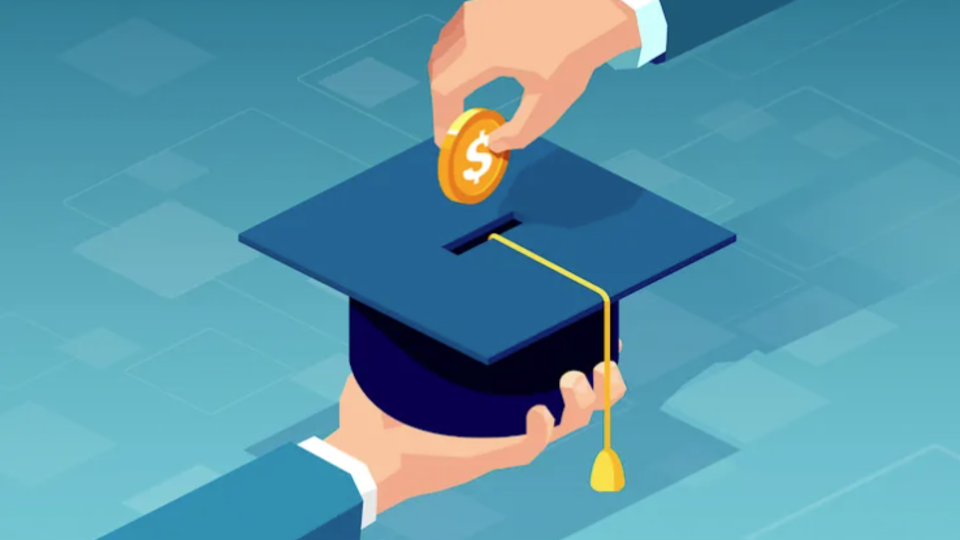
Exclusive: Employers Are Souring On Ivy League Grads, While These 20 “New Ivies” Ascend
You’re not imagining things: The Ivy League is forfeiting its standing as America’s producer of great talent. Here are the schools producing the hard-working high achievers that employers crave.

Balancing Student Life and University Leadership: Meet Executive MBA student Anne Santos
Dive into the journey of Anne Santos, assistant dean for finance and administration at the Glasscock School of Continuing Studies at Rice University. She shares her passion for service and motives for pursuing her MBA.
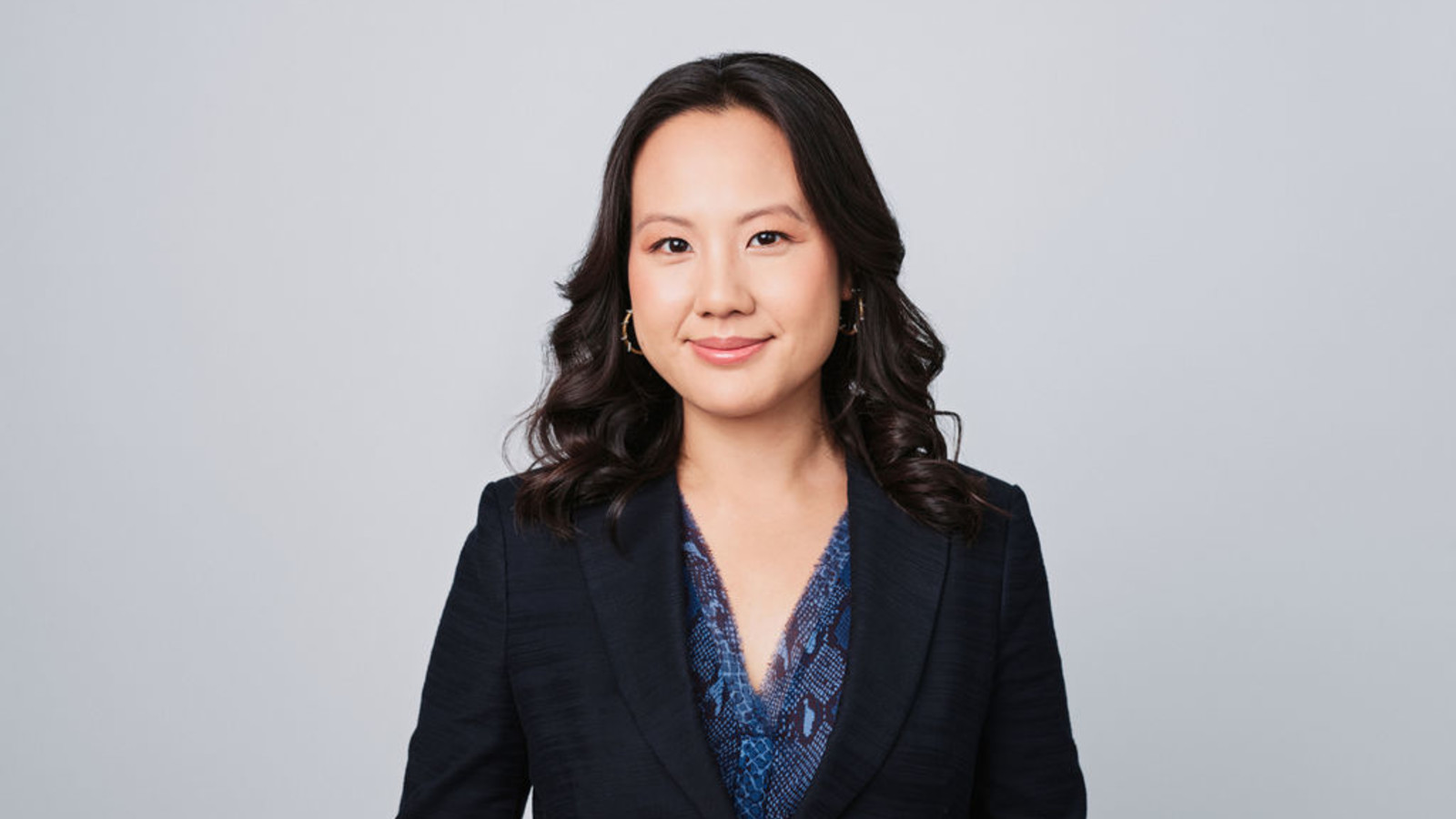
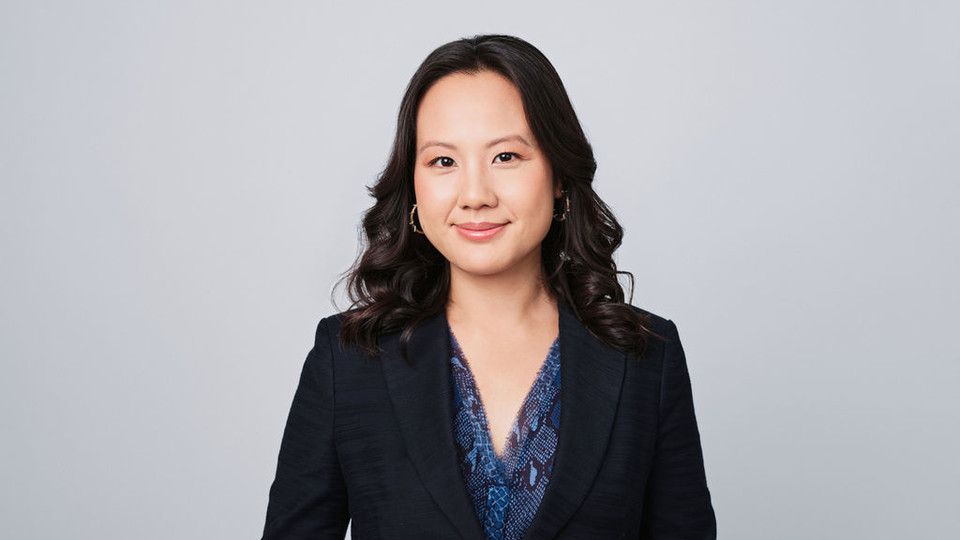
Education and Career Training
I attended Boston University’s School of Hospitality Administration as an undergraduate and obtained a graduate certificate in nonprofit management from Harvard Extension School.
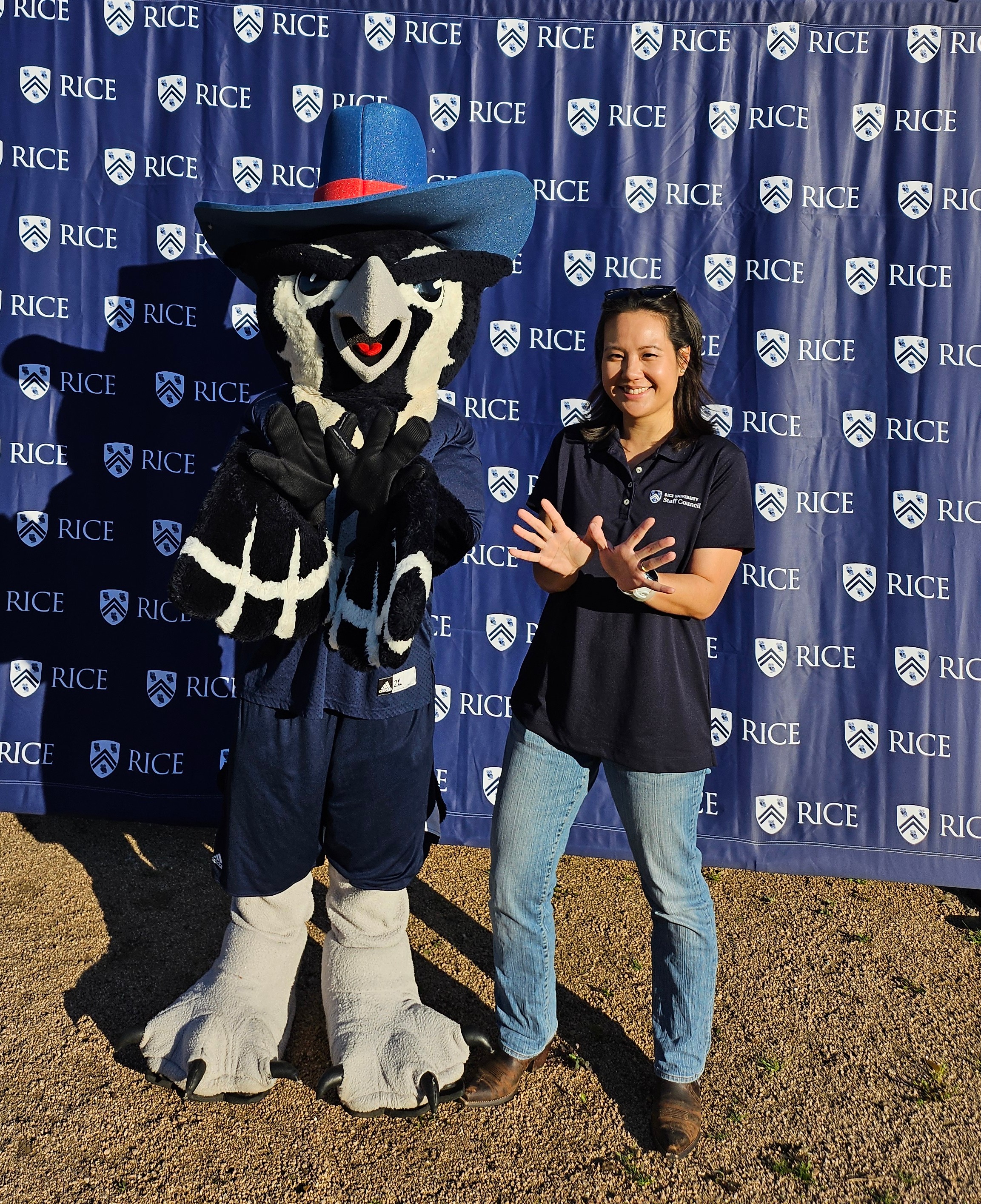
Tell us about your current roles and career journey.
As the assistant dean for finance and administration for the Susanne M. Glasscock School of Continuing Studies at Rice University, I provide strategic guidance and oversight of the Dean’s Office in HR administration, research and grant administration, financial operations, compliance and academic appointments.
My journey toward a career in higher education has been nonlinear and unconventional. I am a first-generation immigrant and grew up in a foreign country where I had to adapt to new customs, culture, behaviors and norms during my formative years. My home environment, language and favorite foods differed from my peers; however, I learned to develop resilience and adaptability over the years.
I chose a career in hospitality because of my genuine fondness for people. Despite being an introvert, I uncovered a passion for creating memorable guest experiences and listening to their stories. Little did I know that these experiences would shape my desire to serve others and, eventually, a greater purpose. In my current role at Rice, it is a privilege to be a part of a community where I can contribute to the growth and success of non-traditional students who face diverse challenges and barriers as professionals while pursuing higher education. The collective efforts of my team members enhance my commitment to making a positive impact.
Why did you choose a Rice Business Executive MBA?
As I evaluated business schools across the nation, I could not ignore the fragmented nature of the American Dream in our politically divided nation. The challenges of AAPI hate, antisemitism, economic pressures and rising costs have cast a shadow on the pursuit of success and equality. However, these factors fuel my determination to make a difference. I refuse to be deterred by obstacles; instead, I am driven to contribute to a society where everyone has equal access to education, opportunities and success.
This uncommon journey led me to Rice's Executive MBA program. Rice's rich diversity of experiences, perspectives and backgrounds mirrors my own path. It was the perfect platform for me to continue my academic pursuits and make an even more significant impact in higher education.
What do you enjoy the most about being a Rice MBA student?
The most enjoyable, for me, is the diversity of the Rice MBA student cohorts and the close-knit community among staff, faculty, students and alumni. Located in the heart of Houston, Rice is uniquely positioned to provide a rigorous academic challenge and a breadth of cultural opportunities, be it in dining, the arts, or anything in between.
How does the program positively impact you at work, and can you share an example of applying what you learned on the job?
We recently concluded a series of sessions on negotiation skills with Jing Zhou, the deputy dean of academic affairs at Rice Business. During these experiential learning sessions, our cohort explored and shared different approaches and outcomes with each other. I was pleasantly surprised at how useful it was for me to apply the various frameworks to negotiate deadlines and project scopes on behalf of the Glasscock School Dean’s Office.
Anne Santos is an Executive MBA student in the Class of 2025.
You May Also Like
The Rice MBA
GRE Scores & Submission Rates At The Top 50 U.S. MBA Programs
23 of 54 business schools grew their GRE submission volume from 2022 to 2023, with the biggest leap coming at Rice Business, which jumped 24 percentage points to 31%.
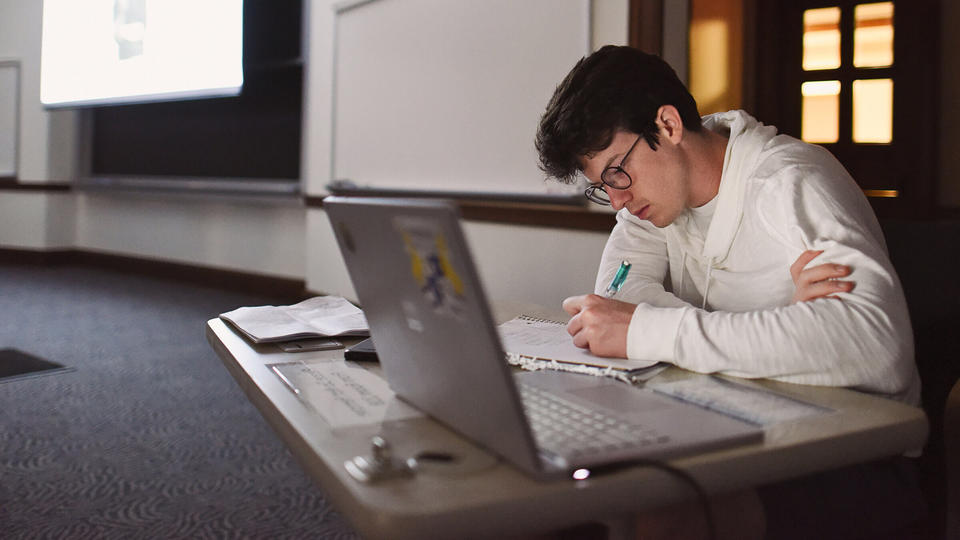
The Leadership Renaissance In Executive Education: Cutting-Edge Programs At The World’s Top B-Schools
Rice Business offers several Executive Education courses that give aspiring leaders a jumpstart on their skills, including Leader as Coach, The Management Incubator and The Leadership Accelerator: a four-day, on-campus class geared towards more senior executives.
